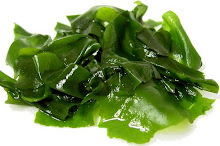
images from algaebase.org
After 2 months of research, I'm at the point where I've gathered a lot of information about sea vegetables! I wanted to share some of my thoughts with you in easily digestible bits:
- Sea vegetables are amazing nutritionally and can be a great part of a balanced diet.
- They are also low in calories and high in protein.
- I don't think that there is a need to eat them daily, but weekly or a couple of times a week is a great way to go as a supplement to land vegetables.
- Sea vegetables are a great source of iodine, and this iodine is more accessible to the body than the iodine found in table salt.
- It is easier for new eaters of sea vegetables to digest them if you start slowly incorporating them into your diet. (much like a vegetarian starting to eat meat again)
- There are some heavy metals concerns about sea vegetables (they absorb whats in the water), but getting them from trusted sources (and places that do some form of testing) and not eating hijiki often (or at all) is a safe option
- There are currently a few distributors that are certificated organic. This certification process has some great requirements, but I am unclear whether non-certified organic distributors also follow the same requirements anyway (ie: is organic certification neccessary?)
- California has some great local suppliers of sea vegetables. These usually small companies hand harvest in Mendocino, where the tides are beneficial for a clean habitat.
- I am more inclined to buy local if I know that these companies are harvesting sustainably and responsibly (you can ask them directly). These companies can be found at farmer's markets locally without going through a middleman (supermarket). This helps the local economy and the harvesters.

